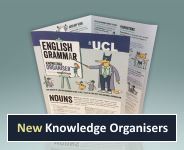Explanation
Nouns constitute one of the major word classes, which includes words for people, animals, and things (teacher, rabbit, desk) and also many words for abstract concepts (kindness, mystery, technology).
The surest way to identify nouns is by the ways they can be used after determiners such as the: for example, most nouns will fit into the frame “The __ matters/matter.”
Nouns are sometimes called ‘naming words’ because they name people, places and ‘things’; this is often true, but it doesn’t help to distinguish nouns from other word classes. For example, prepositions can name places and verbs can name ‘things’ such as actions.
- Our dog bit the burglar on his behind!
- My big brother did an amazing jump on his skateboard.
- Actions speak louder than words.
Not nouns:
- He’s behind you! [this names a place, but is a preposition, not a noun]
- She can jump so high! [this names an action, but is a verb, not a noun]
Nouns may be classified as common (e.g. boy, day) or proper (e.g. Ivan, Wednesday), and also as countable (e.g. thing, boy) or non-countable (e.g. stuff, money). These classes can be recognised by the determiners they combine with.
- common, countable: a book, books, two chocolates, one day, fewer ideas
- common, non-countable: money, some chocolate, less imagination
- proper, countable: Marilyn, London, Wednesday
Typical nouns share a number of grammatical properties, such as the ability to form a plural (teachers, kindnesses) and to occur after a/an or the (a teacher, the kindness of strangers). Collective nouns indicate collections of individuals (e.g. crowd, family, government) and can take either a singular or plural form of a following verb (e.g. My family are/is on holiday.)
See also noun phrase
Englicious contains many resources for English language in schools, but the vast majority of them require you to register and log in first. For more information, see What is Englicious?

